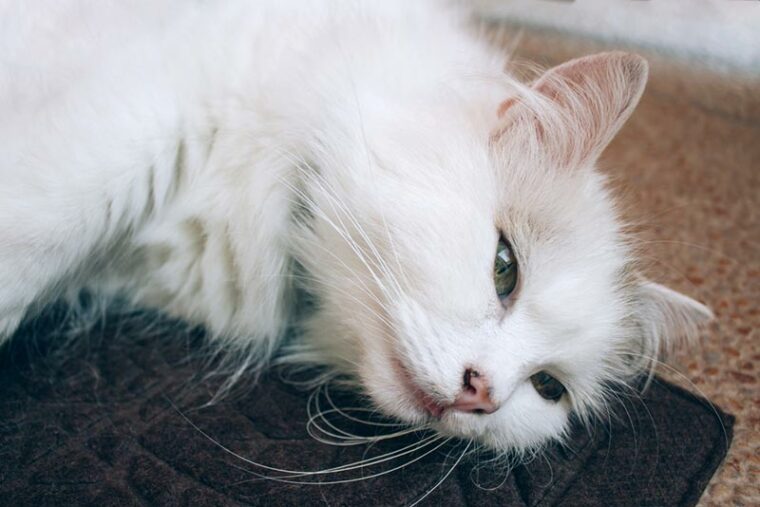
Click to Skip Ahead
Our beautiful little felines bring us so much love and comfort, the last thing that any of us want to think about is losing our beloved cats. But it’s all part of belonging to a cat. If you’ve ever heard about cats purring when they are dying, you might be wondering if that’s true.
The truth is that cats do purr when they are dying. Cats actually purr for more reasons than you might expect.
Here, we talk about all the reasons that cats purr, as well as a few of the signs that a cat is dying. As awful as it is to contemplate, you’ll want to be prepared to help your cat transition peacefully if it’s their time.
Signs That a Cat Is Dying
Whether a cat has been diagnosed with an illness or is just getting on in years, it’s helpful to know what to look for if their health starts to decline.
There are a few different signs that merit a visit to the vet. These don’t always mean a cat is close to death, but there is likely something wrong, so speak to your vet if your cat exhibits any of these symptoms.
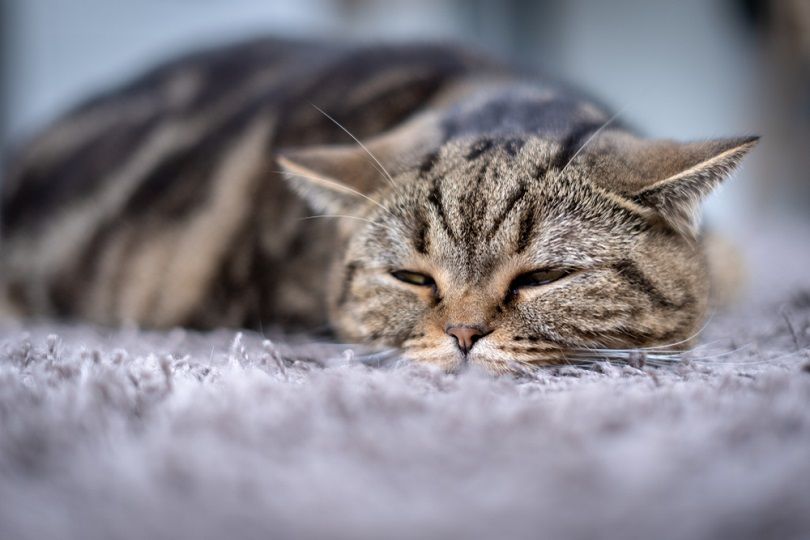
Changes in Behavior
Behavioral changes¹ will see your cat behaving quite differently than usual. If your cat is typically an affectionate lap cat that loves a good cuddle, they may suddenly want to be left alone. This can be normal behavior for some cats nearing the end of their life.
Some cats start to seek out places to be alone, and you might find them behind the couch or under a bed.
Conversely, cats that are normally not cuddly and tend to be independent might suddenly become clingy and seek your attention.
Witnessing a significant change in your cat’s behavior doesn’t always mean there’s something wrong, but when it’s quite sudden, it’s worth checking out.
Lethargy
Another worrisome sign is a lethargic¹ cat. If your energetic cat seems to be suddenly not interested in playing or isn’t accompanying you into the kitchen when it’s dinnertime, it could indicate that your cat is not feeling well or might be in pain.
Even more worrisome is when your cat doesn’t move for an entire day, not even to use the litter box. This merits a visit to your vet as soon as possible.
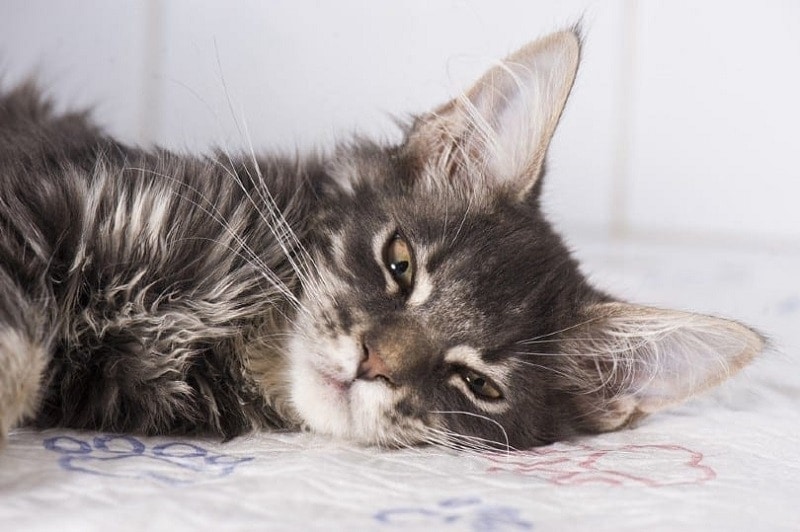
Loss of Appetite
When a cat experiences a loss of appetite¹, it isn’t always an indication of a health issue. But when they skip eating for an entire day, you should check in with your vet.
If you’ve switched their food recently, it might be a case of a finicky cat, but there could be a health issue at play. A lack of appetite in an unwell or old cat isn’t a good sign, so speak with your vet.
Unkempt Appearance
Cats are extremely good at keeping themselves clean and spend an excessive amount of time grooming themselves. So, when a cat’s coat starts to look disheveled, this can indicate a health problem.
Senior cats or cats in pain or feeling sick won’t spend much time, if any, on grooming. They might also be losing hair, sometimes in patches. When you combine this with a lack of appetite, your cat might be looking thin and ragged. Be sure to see your vet.
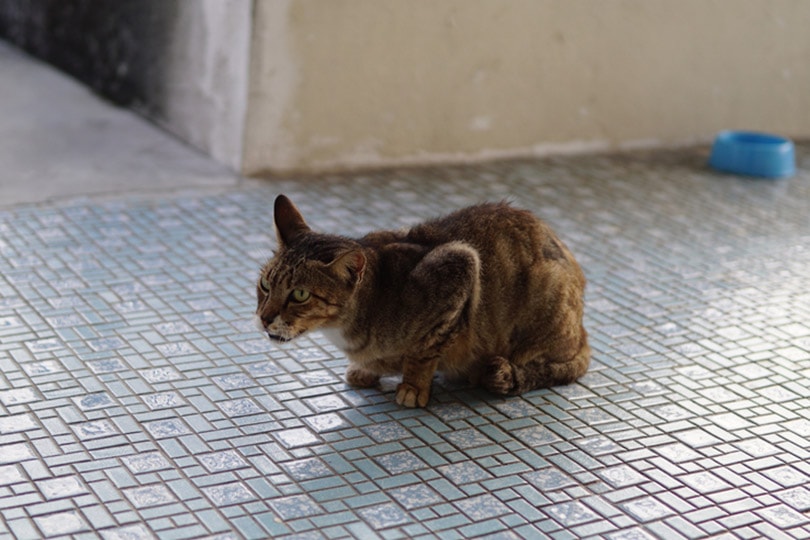
Obvious Decline
There are several indications that a cat is in a decline. Some cats might start to experience vision problems¹, so if you notice your cat bumping into walls and furniture, it might indicate an issue with their eyes.
You might also find that your cat’s usual smooth gait has become unsteady or just very slow. This might be from a cognitive problem, which means your cat’s instincts have slowed down.
Additionally, if a cat starts having breathing difficulties¹, which can include struggling to breathe or unsteady breathing, this is a serious problem that requires an immediate visit to the vet.
You know your cat best, so when you notice your cat exhibiting uncharacteristic signs, you’ll instinctively know that something is wrong. When in doubt, call the vet!
Why Do Cats Purr?
Cats purr for many reasons, including the following.
Contentment
This is by far the most common reason that cats purr and the one that most people assume upon hearing a cat purr. Cats purr when receiving loving pets and when lying in the sun after a good grooming session. You might even hear your cat purring while preparing their dinner. Purring while happy is an automatic and natural reaction in the moment.
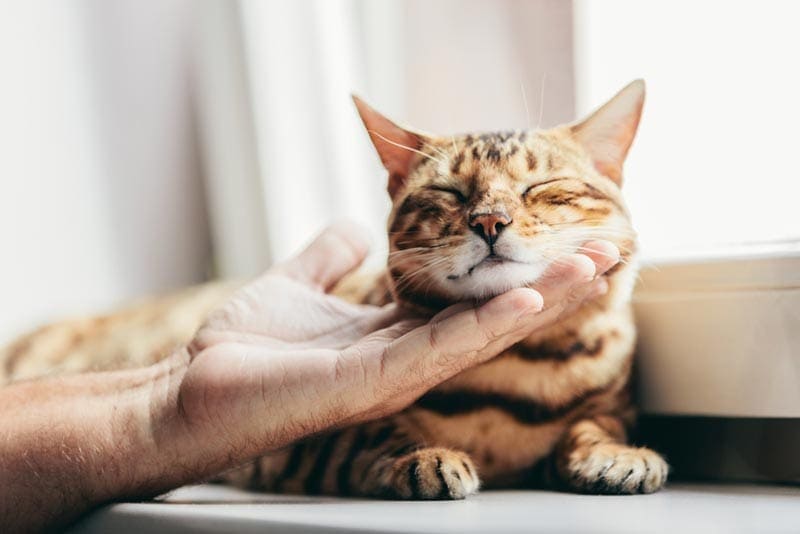
Asking for Something
Sometimes cats will purr when they want something. If it’s getting close to mealtime, you might hear your cat purring while they implore you to feed them with their big eyes. In these cases, the purr tends to be higher in pitch, which adds a certain urgency to it.
Between Cats
When cats familiar with each other come into contact, they will often purr as a form of greeting. It’s thought that they are communicating to each other that they mean no harm and are friendly.
When cats groom each other, you’ll probably hear them purring at these times too. While this type of purring is more than likely from contentment, it might also be a way of signaling their trust in each other.
Between Mother and Kittens
When kittens are only a few days old, they start purring, which is a way of communicating and bonding with their mother and siblings. When the kittens purr, it lets their mother know that her kittens are safe and close by.
Additionally, the mother will purr as a means to communicate to her kittens where she is and that it’s time for nursing. It has the added benefit of comforting and calming her kittens.
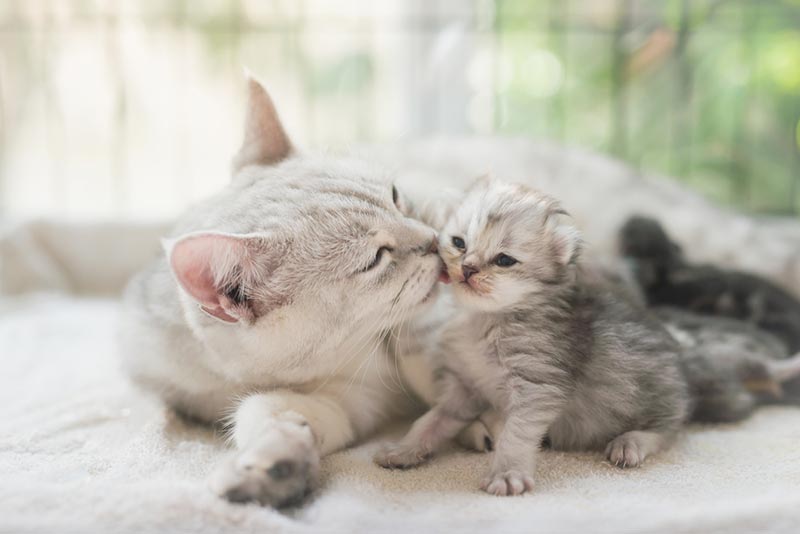
Stress
Cats are sensitive animals, and stress¹ is something that they are quite prone to. Cats will sometimes purr to self-soothe and help themselves calm down when experiencing anxiety and stress.
A stress purr is sometimes accompanied by the cat showing their teeth or panting, and it tends to be higher pitched. Unlike a contented purr, a stress purr is intentional, which means the cat is purring on purpose.
When in Pain
Some cats will also purr when they are in pain in order to self-soothe and self-medicate. It’s quite common for mother cats to purr when in labor.
The purring assists cats in regulating their breathing and provides a vibration that’s believed to promote healing. This low-frequency vibration has been known to help heal bones and wounds, repair tendons, build muscles, and lessen swelling and pain. It’s also been used in studies¹ conducted on human subjects, which saw it successfully stimulate muscle strength and bone growth.
Like with stress purring, it’s a way for the cat to self-soothe.
Why Do Cats Purr When They Are Dying?
For the same reason as when a cat is in pain, they will sometimes purr when they are dying, to soothe themselves. It can help them stay relaxed and calm, and the purring might literally make your cat feel better.
But keep in mind that even if your cat is a senior or hasn’t been well, if they are purring, it doesn’t necessarily mean they are dying. If your cat is curled up next to you or in your lap, they might just be purring because they are content.
Conclusion
Some cats tend to hide more when the end of their life nears, while others might become needier. Make your cat’s final days as pleasant and comfortable as possible. As hard as it is to watch your cat withdrawing from you, their choice needs to be respected.
When your cat is at the end of their natural life, speak to your vet about your options. Some people prefer that the vet make a house call, so their cat can pass peacefully where they are most comfortable. But as long as your comforting presence is there, your cat should pass away knowing that they are well-loved.
Featured Image Credit: Iryna Mylinska, Shutterstock








